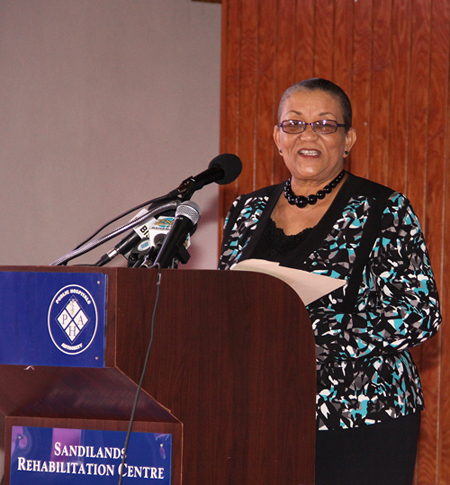|

|
 |
|
Last Updated: Feb 13, 2017 - 1:45:37 AM |

Mrs. Hannah Gray, Acting Managing Director of the Public Hospitals Authority, addressing Thursday's one-day symposium on Suicide Prevention held at the All-Saints Anglican Church Community Centre. (BIS Photo/Patrick Hanna)
|
NASSAU, The Bahamas – Suicide is fast becoming perhaps the most significant public health challenge facing global countries as more persons are dying from suicide on an annual basis than from homicides and wars combined.
Addressing the Opening Session of a one-day Suicide Prevention Symposium, September 10, held as part of the observance of World Suicide Prevention Day, Mrs. Hanna Gray, the Acting Managing Director of the Public Hospitals Authority (PHA), said global statistics further show that more persons die from suicides than those lost to motor vehicle crashes in a number of countries.
Mrs. Gray said what is even more “sobering,” is the fact that there are at least 20 unsuccessful attempts for every suicide recorded.
“It is alarming that globally, more persons die by their own hands each year than those lost to motor vehicle accidents around the world. In fact, in some countries, suicide is a leading cause of death among the aged [while] in other countries suicide has been identified as the leading cause of death for persons between 15-29 years of age,” Mrs. Gray told a packed audience at All-Saints Anglican Church Community Centre.
“What is perhaps more sobering is the fact that for every suicide recorded, there are at least 20 unsuccessful attempts. This makes suicide a significant public health challenge for the global community,” Mrs. Gray added.
Mrs. Gray told those in attendance that the symposium was an essential public health education tool that will empower persons who have direct
contact with those at risk of self-harm as it would provide the skills necessary to recognize those who may be vulnerable to suicide and attempted suicide and to intervene and refer those in crisis for appropriate support and specialist services.
“With the stigma surrounding suicide, it is understandable that so many persons feel intimidated, fearful, hostile or powerless when confronted with the issue,” Mrs. Gray said.
“However, symposia like this one, helps to spread the vitally important message that there are concrete steps that can be taken which can lower the risk of suicide. There is no doubt that the most important starting point for us going forward is the understanding that while every suicide is an individual tragedy, suicide is ultimately a preventable public health concern.”
Mrs. Gray said research has shown that limiting access to common means of suicide such as poisons or firearms can have an effect in lowering the rate of suicide. Intervention by trained professionals, she said, is also essential.
“Early identification of persons who are vulnerable to suicide is at the root of any successful intervention.”
Mrs. Gray said persons suffering from mental illness or persons dealing with substance abuse issues are considered at a higher risk from suicide while those who are suffering, or have suffered physical or sexual abuse or have a family history of suicide, are considered vulnerable.
According to the International Association of Suicide Prevention (IASP), the act of showing care and concern to someone who may be vulnerable to suicide has been shown to make a difference. Asking “are you okay” and offering a listening ear in a non-judgmental way, are said to have “a significant impact” as does letting vulnerable persons know that someone cares about them. “Isolation increases the risk of suicide, but research has shown that establishing connections with someone who has become isolated and disconnected can help to prevent suicide,” Mrs. Gray added.
Mrs. Gray said outreach should not be targeted only at those who are at risk as the loved ones of persons lost to suicide can also be adversely affected.
“These persons who are left behind also need support, compassion and assistance as they grieve and heal in the wake of such deep and tragic trauma. They may experience embarrassment and shame related to the manner of death of their loved one, in addition to the more common signs of bereavement.
“They and their families may become the victims of gossip or be featured in headlines or publicized via social media without regard for the loss they have experienced. These casual cruelties can exacerbate the pain and trauma associated with a loved one’s suicide, but the caring outreach from persons in their environment can make a positive difference in their healing journey,” Mrs. Gray added.
One-fourth of Bahamas' residents have considered suicide, study claims

© Copyright 2015 by thebahamasweekly.com
Top of Page
|
|
 |

|
